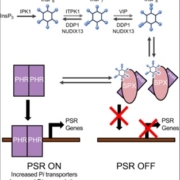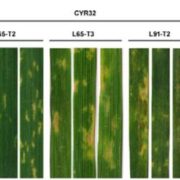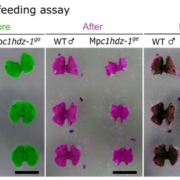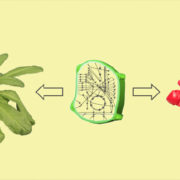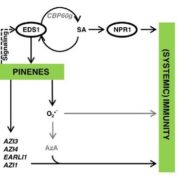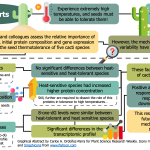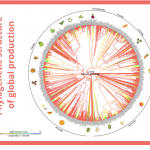A bacterial effector targets a plant iron sensing protein, and benefits pathogen growth (Plant Cell)
 Pathogens often appropriate iron from their hosts, as acquisition of iron is vital to sustain life for most organisms. As demonstrated in this paper by Xing et al., an effector protein, AvrRps4, from a common bacterial plant pathogen, Pseudomonas syringae, directly interacts with BRUTUS (BTS), an iron sensing protein in Arabidopsis thaliana. In iron sufficient conditions, BTS prevents over-accumulation of iron by degrading transcription factors (TFs) responsible for iron import. When challenged with AvrRps4, plants heterologously co-expressing BTS and these TFs show increased apoplastic iron levels, as AvrRps4 prevents TF degradation by BTS. In wildtype plants, which are capable of recognizing and responding to AvrRps4, challenge with the effector triggers immune responses and results in lowered iron availability. AvrRps4 is sensed by its receptor pair in planta, and an immune response is mounted through the Enhanced Disease Susceptibility1 (EDS1) protein family, a well-characterized receptor involved in effector triggered immunity. However, in mutants which lack AvrRps4 receptors or EDS1, AvrRps4 is free to inhibit the regulatory function of BTS, resulting in increased apoplastic iron levels and allowing pathogen proliferation. Another function of BTS is to stabilize EDS1 protein levels in planta; BTS upregulates EDS1 in response to AvrRps4. Together these findings show that AvrRps4 targets BTS, which is involved in iron homeostasis as well as resistance to AvrRps4. (Summary by Marlo Hall @marloXplants). Plant Cell 10.1093/plcell/koab075
Pathogens often appropriate iron from their hosts, as acquisition of iron is vital to sustain life for most organisms. As demonstrated in this paper by Xing et al., an effector protein, AvrRps4, from a common bacterial plant pathogen, Pseudomonas syringae, directly interacts with BRUTUS (BTS), an iron sensing protein in Arabidopsis thaliana. In iron sufficient conditions, BTS prevents over-accumulation of iron by degrading transcription factors (TFs) responsible for iron import. When challenged with AvrRps4, plants heterologously co-expressing BTS and these TFs show increased apoplastic iron levels, as AvrRps4 prevents TF degradation by BTS. In wildtype plants, which are capable of recognizing and responding to AvrRps4, challenge with the effector triggers immune responses and results in lowered iron availability. AvrRps4 is sensed by its receptor pair in planta, and an immune response is mounted through the Enhanced Disease Susceptibility1 (EDS1) protein family, a well-characterized receptor involved in effector triggered immunity. However, in mutants which lack AvrRps4 receptors or EDS1, AvrRps4 is free to inhibit the regulatory function of BTS, resulting in increased apoplastic iron levels and allowing pathogen proliferation. Another function of BTS is to stabilize EDS1 protein levels in planta; BTS upregulates EDS1 in response to AvrRps4. Together these findings show that AvrRps4 targets BTS, which is involved in iron homeostasis as well as resistance to AvrRps4. (Summary by Marlo Hall @marloXplants). Plant Cell 10.1093/plcell/koab075


